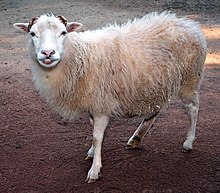양
| ||||||||||
| 야약앾앿얀얁얂 얃얄얅얆얇얈얉 얊얋얌얍얎얏얐 양얒얓얔얕얖얗 | |
| 애 ← | → 얘 |
|---|---|
Jeju[edit]
Pronunciation[edit]
| Romanizations | |
|---|---|
| Revised Romanization? | yang |
| Revised Romanization (translit.)? | yang |
| Yale Romanization? | yang |
Etymology 1[edit]
Interjection[edit]
양 (yang)
Synonyms[edit]
Etymology 2[edit]

Sino-Korean word from 羊.
Noun[edit]
양 (yang) (counter ᄆᆞ리)
Korean[edit]
Etymology 1[edit]
Sino-Korean word from 量 (“quantity”)
Pronunciation[edit]
- (SK Standard/Seoul) IPA(key): [ja̠ŋ]
- Phonetic hangul: [양]
| Romanizations | |
|---|---|
| Revised Romanization? | yang |
| Revised Romanization (translit.)? | yang |
| McCune–Reischauer? | yang |
| Yale Romanization? | yang |
- South Gyeongsang (Busan) pitch accent: 양의 / 양에 / 양까지
Syllables in red take high pitch. This word always takes low pitch, and heightens the pitch of two subsequent suffixed syllables.
Noun[edit]
| South Korean Standard Language |
양(量) (yang) |
|---|---|
| North Korean Standard Language |
량(量) (ryang) |
Derived terms[edit]
- See the hanja entry at 量 for Sino-Korean compounds of 양 (量, yang).
Etymology 2[edit]
Sino-Korean word from 羊 (“sheep, goat”)
Pronunciation[edit]

- (SK Standard/Seoul) IPA(key): [ja̠ŋ]
- Phonetic hangul: [양]
| Romanizations | |
|---|---|
| Revised Romanization? | yang |
| Revised Romanization (translit.)? | yang |
| McCune–Reischauer? | yang |
| Yale Romanization? | yang |
- South Gyeongsang (Busan) pitch accent: 양의 / 양에 / 양까지
Syllables in red take high pitch. This word takes low pitch only before consonant-initial multisyllabic suffixes.
Noun[edit]
양 • (yang) (counter 마리, hanja 羊)
Derived terms[edit]
- See the hanja entry at 羊 for Sino-Korean compounds of 양 (羊, yang).
Etymology 3[edit]
Sino-Korean word from 陽 (“yang”).
Pronunciation[edit]
- (SK Standard/Seoul) IPA(key): [ja̠ŋ]
- Phonetic hangul: [양]
| Romanizations | |
|---|---|
| Revised Romanization? | yang |
| Revised Romanization (translit.)? | yang |
| McCune–Reischauer? | yang |
| Yale Romanization? | yang |
Noun[edit]
- (philosophy) yang (the essential male principle in East Asian religion or philosophy)
- Coordinate term: 음(陰) (eum)
Derived terms[edit]
- See the hanja entry at 陽 for Sino-Korean compounds of 양 (陽, yang).
Etymology 4[edit]
Sino-Korean word from 孃 (“woman, girl”)
Pronunciation[edit]
- (SK Standard/Seoul) IPA(key): [ja̠ŋ]
- Phonetic hangul: [양]
| Romanizations | |
|---|---|
| Revised Romanization? | yang |
| Revised Romanization (translit.)? | yang |
| McCune–Reischauer? | yang |
| Yale Romanization? | yang |
Noun[edit]
- Miss (used after the names of young women, especially by older speakers)
- Coordinate term: 군(君) (gun, used for young men)
Derived terms[edit]
- See the hanja entry at 孃 for Sino-Korean compounds of 양 (孃, yang).
Etymology 5[edit]
Sino-Korean word from 兩 (“two”).
Pronunciation[edit]
- (SK Standard/Seoul) IPA(key): [ja̠(ː)ŋ]
- Phonetic hangul: [양(ː)]
- Though still prescribed in Standard Korean, most speakers in both Koreas no longer distinguish vowel length.
| Romanizations | |
|---|---|
| Revised Romanization? | yang |
| Revised Romanization (translit.)? | yang |
| McCune–Reischauer? | yang |
| Yale Romanization? | yāng |
Determiner[edit]
| South Korean Standard Language |
양(兩) (yang) |
|---|---|
| North Korean Standard Language |
량(兩) (ryang) |
Derived terms[edit]
- See the hanja entry at 兩 for Sino-Korean compounds of 양 (兩, yang).
Etymology 6[edit]
Sino-Korean word from 洋 (“ocean; Western (because Westerners came by sea)”).
Pronunciation[edit]
- (SK Standard/Seoul) IPA(key): [ja̠ŋ]
- Phonetic hangul: [양]
| Romanizations | |
|---|---|
| Revised Romanization? | yang |
| Revised Romanization (translit.)? | yang |
| McCune–Reischauer? | yang |
| Yale Romanization? | yang |
Prefix[edit]
Suffix[edit]
Derived terms[edit]
- See the hanja entry at 洋 for Sino-Korean compounds of 양 (洋, yang).
Etymology 7[edit]
Sino-Korean word from 良 (“good”).
Pronunciation[edit]
- (SK Standard/Seoul) IPA(key): [ja̠ŋ]
- Phonetic hangul: [양]
| Romanizations | |
|---|---|
| Revised Romanization? | yang |
| Revised Romanization (translit.)? | yang |
| McCune–Reischauer? | yang |
| Yale Romanization? | yang |
Noun[edit]
| South Korean Standard Language |
양(良) (yang) |
|---|---|
| North Korean Standard Language |
량(良) (ryang) |
- The fourth-highest score in the five-point grading system in South Korean schools, ultimately abolished in 2012; equivalent to D in the Roman alphabet grading scheme.
Affix[edit]
Derived terms[edit]
- See the hanja entry at 良 for Sino-Korean compounds of 양 (良, yang).
Etymology 8[edit]
Sino-Korean word from 壤 (“yang”)
Numeral[edit]
- (uncommon) 1028
- (The addition of quotations indicative of this usage is being sought:)
Affix[edit]
Derived terms[edit]
- See the hanja entry at 壤 for Sino-Korean compounds of 양 (壤, yang).
Etymology 9[edit]
Modern Korean reading of various Chinese characters.
Syllable[edit]
양 (yang)
| Extended content |
|---|
Etymology 10[edit]
Modern Korean reading of various Chinese characters in isolation or as the first element of a compound. As the non-initial element of a compound, they are read as 량 (ryang).
In North Korea, after a language reform in the mid-twentieth century intended to make Sino-Korean readings uniform, they are always read as 량 (ryang)in all environments.
Syllable[edit]
양 (yang)
| Extended content |
|---|
|
References[edit]
- Supreme Court of the Republic of Korea (대한민국 대법원, Daehanmin'guk Daebeobwon) (2018). Table of hanja for personal names (인명용 한자표 / 人名用漢字表, Inmyeong-yong hanja-pyo). [1]
- Character boxes with compositions
- Hangul Syllables block
- Hangul script characters
- Jeju terms with IPA pronunciation
- Jeju lemmas
- Jeju interjections
- Jeju nouns
- Sino-Korean words
- Korean terms with IPA pronunciation
- Korean terms with dialectal pitch accent marked
- Korean lemmas
- Korean nouns
- ko:Philosophy
- Korean terms with long vowels in the first syllable
- Korean determiners
- Korean prefixes
- Korean terms with usage examples
- Korean suffixes
- Korean affixes
- Korean numerals
- Korean terms with uncommon senses
- Korean cardinal numbers
- Hanja readings
- South Korean
- Korean pitch accent minimal pairs
- ko:Caprines